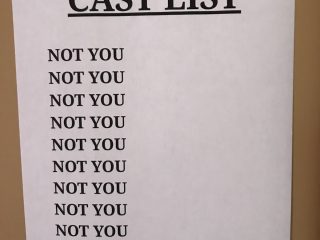So, you’ve got your training under your belt, moved to the big city, and are ready to find your first agent! It is a huge step in your career to sign with your first agent. But where do you begin? What the heck does an agent even do anyways?
Plain and simple: an agent’s job is to find work for the actors on their client list. Their job is to submit actors for auditions, push to get their clients into the room, follow up on submissions, negotiate better pay and contracts, and much, much, more. Agents work hard to cultivate relationships with casting directors and creatives, which helps to expand an actor’s network. For the difference between a talent agent and a talent manager, check out this video below:
While having an agent isn’t a necessity, a good agent can be a massive help to your career. However, if you’re looking for work as a self-represented actor, stay tuned for our forthcoming blog post on that topic! Agents can help to bridge the gap between the early stages of your career and making the leap into more high-profile jobs. So, if you’re on the hunt for your first agent, keep reading!
Putting Together Your Package
In order to submit for agency representation, you need to put together a set of marketing materials so that an agent knows what your strengths are and how you may fit into their agency. It’s important to show an agent who you are and what your skills are, so that they can understand how best to represent you. There are three main elements you need for your marketing material:
- Headshots – Headshot photos are the most important part of your package. This image is an agent’s first introduction to who you are and gives them an idea of your casting bracket. Your headshots must be high-quality images of what you actually look like. Did you recently get bangs or dye your hair? Make sure the headshots you’re sending to agents are up-to-date with your current look.
- Resume – List all training, credits, and any union affiliations you may have (SAG-AFTRA, Equity, etc.) If you’re just starting out, no need to stress about how many credits you have. Be honest about your special skills (don’t write that you’re an advanced figure skater if you’ve never strapped on a pair of skates before) and make sure your resume formatting is easy to read.
- Demo Reels – Next to your headshots, your reels are arguably the most important part of your package. If you’re looking for a film/TV agent, you need to have footage of your best acting work. This doesn’t have to be from an actual project, a good quality self tape works just as well! For voice over agents, make sure you have a reel that features the range of vocal qualities you have. If you’re looking for a musical theatre agent, make sure you have footage of you singing at least 2 contrasting songs. If you have footage of your dancing, even better! This all helps agents to get a sense of which shows you would be best suited for.
Do Your Research
Decide which type of agent you want to approach.
There are thousands of agencies to choose from, so where do you begin? First, start off by knowing which area of entertainment you want to focus on. Lots of agencies manage artists in all areas of theatre and film/TV, but lots of agencies specialize in just one. Do your research to find out what the agency is known for and what areas of the industry their clients work most in.
Where are they located?
Make sure the agent represents clients that are located in the same area as you. If you live in L.A. and want to be represented by an agency in New York, make sure they represent clients on both coasts before writing to them.
How do they operate?
Will you be represented by a single agent or, if there’s multiple agents at the agency, do they share a client list? This would mean all the agents are working with you, instead of a single agent. It’s important to find out if the agency is exclusive or not; some agencies will allow you to work with another specialized agency along with them (such as a commercial or voice over agent).
What is the size?
The size of an agency can also impact your decision. It can be easy to get lost in an agency with a huge client list, however larger agencies may have a wider range of industry contacts. In boutique agencies, you’re more likely to get individualized attention, especially if you’re just starting out.
Who is already on their list?
If an agent already has a few clients that look like you or have a similar skill set, they won’t be as keen to sign you. An agent is looking to have as diverse of a client portfolio as possible. Make sure to highlight what will set you apart when writing to agents.
Find Reputable Agencies
Since there are thousands of agencies, how do you know who is reputable? One of the easiest places to start is with professional lists such as SAG-AFTRA franchised agents (USA) or The Personal Managers’ Association (UK). If you have any industry connections such as directors, casting directors, or acting coaches, ask if they can recommend any local agencies to you. Ask friends who have agents how they like their agency! You can even ask if they would be willing to vouch for you and give you a positive reference if you submit to their agent.
Look Out for Red Flags
As you are scrolling endlessly through agency websites, there are a few red flags to be on the lookout for:
- An agency should never require you to pay an upfront fee. All agents should be paid via an agreed upon percentage of your earnings. Most agents take between 10% – 15% depending on the country/region where you’re located and the medium (some agents will also take a smaller percentage for theater than film/TV). If you’re in doubt about what a fair percentage is, check out the Equity or SAG-AFTRA guidelines.
- Are you easily able to find out what work their clients have been in? Not every agency website will have their client roster available, but almost every agency website will contain a “News” section to highlight recent jobs their actors have booked. If you can’t find any information on the agency’s website or social media about clients in work, that would be a red flag.
- If an agent is pressuring you to sign a contract without giving you the time to read it, run awaaaaaay! Always take that time to read your contract over in detail. A good agent won’t mind you taking your time to do your due diligence.

Photo by Sander Sammy on Unsplash
While you’re compiling your list of agencies, have a good mix of small, medium, and big agencies to write to. Apply to agencies of various levels and don’t be afraid to shoot your shot with the big agencies!
Start Submitting!
Once you’ve narrowed down your list, it’s time to start firing off those emails! In general, a list of 20 agencies is a good place to start. You will need to come up with a personalized cover letter for each of the submissions. Here’s a few tips for writing that letter:
- Know what the submission requirements are! Usually the agency website will clearly state where to send the email, who to address it to, and any other formatting for sending your representation information. Double check that you spell the name of the person you’re addressing the email to correctly!
- Keep your letter short and to the point. Tell them about your type and skill set, so the agent can understand what sort of performer you are. Highlight your unique selling points and let them know why you would be an asset to their agency.
- Let the agency know why you are writing to them in particular. They know you are looking for representation, but what about their agency specifically is appealing to you?
- If you know someone at the agency, see if they will make an introduction on your behalf! Something as simple as “Look out for my friend so-and-so who will be emailing you in the next few days” is great. This allows you to reference your mutual connection in your cover letter to the agency.
- In general, attaching links to unlisted YouTube videos or a Spotlight link is better than attaching a downloadable file. Keep your submission down to two reels and two headshots. Too much material can be overwhelming for the agents to go through.
It can take many months of applying to agencies before you even secure a meeting. Don’t stress too much! You may not land a meeting because the agent isn’t currently looking for new clients or newer actors. You can always resubmit in a few months time, updating them with new shows or roles you’ve done since writing to them last.
Having “The Meeting”
So, after all that writing and waiting, you’ve finally secured a meeting! Amazing!
Remember that this meeting is not just for the agent to get to know you; it’s also for you to see if you would enjoy working with the agent. Always meet in a public place or at the agent’s office, and if you’re under 18, bring a parent/guardian to the meeting. Be ready to discuss where you see yourself in the industry and what assets you would bring to the agency. Do your homework and come prepared with questions for the agent. Some good questions to ask in the meeting include:
- How long have they been an agent & what’s their previous work experience?
- What’s the commission structure?
- What’s your preferred communication method? Some agents may want you to direct all communication through an assistant.
- Do you have any affiliated agencies? Some agents may have affiliations with another specialist agency such as one for voice over or commercial work.
- What’s the termination notice? Probably not the first question you want to ask, but it is good to know about any protocols for leaving upfront.
If you have any accessibility requirements such as dyslexia or are neurodivergent, let them know in the meeting! An agent is there to help make auditions more accessible for you and to communicate with the creative team to make sure your needs are met.
You may receive an offer of representation in the meeting or afterwards. You may not receive one at all, but the agent should follow up shortly after the meeting to let you know whether or not they’d like to offer you representation. If you receive an offer, there’s no need to rush into anything. Take the time to consider all your options before making a decision.
The relationship between an actor and an agent is a very important one. Once you’ve signed with an agent, it’s important to maintain a good relationship with them. Be quick to respond when your agent gets in touch, keep them informed of your availability, and keep on top of your craft and marketing materials. Finding your first agent can feel like a daunting task, but if you are proactive in your search and persevere, the right agent will come your way!















3 comments
Looking for an agent for my 12 year old who is very interested In acting
Dear fellow theater lovers a long time ago, in the 80s, my decade of choice, I was accepted to the American academy of dramatic arts in Pasadena California . I auditioned at a university in Kansas City Missouri which was the closest representative location for the AADA in my area The director I must say, prepared me for at least 37 percent of the times I would be home crying in dealing with the heartaches of this business. I was so young at the time and I didn’t know anything about financial aid I’m pretty sure my parents didn’t either… I know that doesn’t sound very logical or feasible.. but it is true…
Well I was recommended by the gentleman that I auditioned for… and of course my parents never sat us kids down and talked to us about any kind of future after graduation from high school.. so with no financial aid and parents offering to drive me back and forth to McDonald’s to work, so I ended up not going to the academy.
I have lived with that regret hovering over my head for a long time.. I just would like to mention and ask a favor could you please help make sure that young people having opportunities like, I did , know how to act on them how to get financial aid how to stand strong even if their family doesn’t support them how to recognize their resources and use them.. how to stand up and say here I am world now everyone get off the stage, IT’S MY TURN!!!! Basically t they might have to advocate for themselves if no one else will…I realize that’s kind of sappy sounding, hey, I’m in theater what else would you expect… I probably borrowed it from some musical anyway I just don’t rememberI…. young people depend on older people to point out some things that are very important,. things the young people might not discover on your own because it might be too late when they do discover them.. in other words folks people like yourself can actually be their AGENTS in this department, I hope that you can do this…. I don’t want people to end up like me years later wondering and not knowing what could have happened if I had went to the school. And yes I totally realize that my composition of this small but efficiently outstanding email could really be honored by having some decent spelling and structure, I can only do one email at a time though laugh out loud 😀 Thank you for accepting this comment and for dwelling on every word I said okay that might have been tooting my own horn but in my defense I had to have something to fall back on!!!
Looking for a reliable agent for my movies